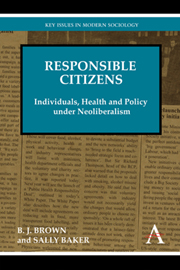Book contents
- Frontmatter
- Contents
- Acknowledgements
- Preface
- Chapter One Introduction
- Chapter Two Individualism, Neoliberalism and the Imperatives of Personal Governance
- Chapter Three Individualism in Healthcare
- Chapter Four Enlisting, Measuring and Shaping the Individual in Healthcare Policy and Practice
- Chapter Five Mental Health and Personal Responsibility
- Chapter Six Responsibility in Therapy and the Therapeutic State
- Chapter Seven The Punitive Turn in Public Services: Coercing Responsibility
- Chapter Eight Thinking about Ourselves
- Chapter Nine Talking Citizenship into Being
- References
- Index
Chapter Eight - Thinking about Ourselves
Published online by Cambridge University Press: 05 December 2012
- Frontmatter
- Contents
- Acknowledgements
- Preface
- Chapter One Introduction
- Chapter Two Individualism, Neoliberalism and the Imperatives of Personal Governance
- Chapter Three Individualism in Healthcare
- Chapter Four Enlisting, Measuring and Shaping the Individual in Healthcare Policy and Practice
- Chapter Five Mental Health and Personal Responsibility
- Chapter Six Responsibility in Therapy and the Therapeutic State
- Chapter Seven The Punitive Turn in Public Services: Coercing Responsibility
- Chapter Eight Thinking about Ourselves
- Chapter Nine Talking Citizenship into Being
- References
- Index
Summary
Introduction: Reflexive Work on the Self
In this chapter, we take a closer look at what all the reflection on the entrepreneurial self-producing and self-projecting self that we described in the previous chapters might mean. The matrix of forces described earlier, with a variety of fields of public service and therapeutic enterprise emphasizing the importance of the individual taking responsibility, encourages a particular kind of consciousness in the early twenty-first century under conditions of advanced liberalism.
The broad spectrum of encouragement toward greater responsibility necessitates an increasingly reflexive kind of work on the self. As a number of commentators such as Giddens (1991) and Beck (1992) have proposed, this is a kind of self which is self-produced as a result of the techniques of biography and through fostering the ability to apprehend and reflect upon the risks that surround the self. For Giddens and Beck this represents a model of the self that can be universally applied. For Beck, whilst individuals are not able to escape structural forces in general, they are to some extent able to decide which forces they should act upon and which can be ignored. This, says Beck, does not create a ‘free’ individual, but instead yields individuals whose biographies embody or live out the complexity and diversity of the social relations in which they are embedded.
In this chapter we will begin with some reflections on the idea that selves are a kind of project, an idea found especially within the work of Anthony Giddens and Zygmunt Baumann.
- Type
- Chapter
- Information
- Responsible CitizensIndividuals, Health and Policy under Neoliberalism, pp. 143 - 162Publisher: Anthem PressPrint publication year: 2012

